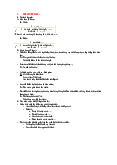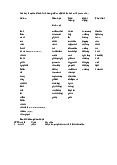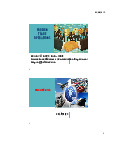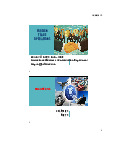





Preview text:
MODULE HANDBOOK 2021/2022
MATH1179 Mathematics for Computer Science Contents 1.
Welcome to the Module ........................................................................................................ . 2 2.
Key Contacts .......................................................................................................................... 3 3.
Key Module Specification Details ........................................................................................... 3 4.
Employability Skills Gained .................................................................................................... 3 5.
Schedule of Teaching and Learning Activities ........................................................................ 4 6.
Assessment Tasks.................................................................................................................. 4 7.
Reading Lists.......................................................................................................................... 5 8.
Additional Module Specific Information and Costs................................................................. 5 9.
Glossary of Terms .................................................................................................................. 5 1 | P a g e
1. Welcome to the Module
Welcome to MATH1179 Mathematics for Computer Science! This is a 15-credit course on various
programmes offered by the School of Computing and Mathematical Sciences.
Hopefully the course will enable you to strengthen your existing subject knowledge and prepare
you for future courses with the application of the course material in mind.
Material for the lectures and tutorials is provided on Moodle in electronic form.
This handbook provides essential information that you will need during your undertaking of this
module. It is not intended to be exhaustive, but should help you to see at a glance key information
about the module such as the aims and learning outcomes, the proposed schedule of delivery,
assessment details, reading list and any additional resources that will be needed by you. Please
ensure that you familiarise yourself with its contents.
The university will do all that it reasonably can do to provide educational services to support your
learning. Sometimes circumstances may mean that we cannot provide such educational services
or that the university has to withdraw or change aspects of this module and/or student services
detailed in the information you have been provided with by the university. This might be because of, for example:
• industrial action by university staff or third parties;
• the unanticipated departure or absence of key members of university staff; • acts of terrorism;
• the acts of any government or local authority;
• academic changes within subject areas; or
• where the numbers expected on a module are so low that it is not possible to deliver an
appropriate quality of education for students enrolled on it.
In these circumstances, the university will take all reasonable steps to minimise the resultant
disruption to those services and to affected students, for example by making reasonable
modifications, but to the full extent that it is possible under the general law, the university excludes
liability for any loss and/or damage suffered by any applicant or student as a result of these circumstances.
The modifications we make may be to:
• the content and syllabus of module ,
s including in relation to placements;
• the timetable, location and number of classes;
• the content or method of delivery of your module;
• the examination process; and
• the timing and method of assessment
Many of the changes that we make are in response to feedback from students and are intended
to improve the experience of students and student outcomes.
In making any changes, the university will aim to keep significant changes to the minimum
necessary and will notify and where reasonably possible also consult with you in advance about
any significant changes that are required. 2 | P a g e 2. Key Contacts
The list below summarises the contact details of key individuals relevant to this module.
Module Leader: Dr Yvonne Fryer Location: QM305 Email: y.d.fryer@gre.ac.uk Tel: 0208 331 8431 Office hours: tb c
Module Instructor: Professor Jixin M a Location: QM405 Email: mj21@gre.ac.u k Tel: Office hours: tb c External Examiner: Not applicable
3. Key Module Specification Details
School/Department: School of Computing and Mathematical Sciences Number of Credits: 15
Term of delivery: Term 1
Site of delivery: Greenwich Maritime site
Pre-requisites/Co-requisites:
GCSE Mathematics or equivalent Aims:
The main aim it to prepare students with sufficient mathematics tools and techniques for the
level 5 Computer Science mathematics courses associated with these programmes and
possible level 6 mathematics courses. The course aims to ensure students have fundamental
mathematics knowledge, of a similar level to A’ level mathematics and above. Knowledge
acquired and revisited is to be learnt at a deeper level than, for example, a student simply
revising for a final module exam. Hence the course is to be divided into two sections, assessed
by online test. It is envisaged that labs would be timetabled for students to take the tests, when
the student is ready. A student with excellent mathematical skills might decide to take the tests
earlier than a student with less recent mathematics experience. A student will be allowed to
retake the tests, until they pass, even in term 2 if necessary, as the mathematics offered is
fundamental to the progression of the student to later courses. Learning Outcomes:
On successful completion of this course a student will be able to:
1 Demonstrate an understanding of sets, logic and their application in computing.
2 Understand vectors and matrices and apply them to a range of problems.
3 Demonstrate an understanding of graph theory and discrete mathematics algorithms.
4 Apply arithmetic and algebraic expressions in a range of number types and bases.
5 Apply a variety of calculus techniques, such as differentiation and integration.
6 Apply the principles of statistics and probability and use software for data analysis and data
visualisation and be able to interpret results.
4. Employability Skills Gained
Students will enhance their mathematical skills and problem solving skills.
Throughout the course you will gain or improve valuable skills useful for your future employability. 3 | P a g e
A number are highlighted below: Learning Activity Cognitive Skills
The ability to analyse a problem and find a solution. Generic Competencies
Working as part of a group and individually.
Communication skills both oral and written. Personal Capabilities Time and work management. Technical Ability Use of software such as Excel
You can find out more about the Greenwich Employability Passport online
https://www.gre.ac.uk/articles/ils/greenwich-employability-passport-for-students
Information about the Career Centre is also available online
https://www.abintegro.com/public/career-transition-and-jo - b search
You can log on to the Career Centre wit h your Portal ID and Passwor d
https://orca.gre.ac.uk/cas/login?service=https://idp.gre.ac.uk/oala/auth.php
5. Schedule of Teaching and Learning Activities
The following table details the indicative contents for the teaching weeks for the module. Week beginning Activity 20/09/2021
Welcome week (no lecture or tutorials) 27/09/2021 Sets 04/10/2021 Numbers, number bases 11/10/2021
Algebra, Sequences & series 18/10/2021
Propositional logic, logic gates & circuits 25/10/2021
Predicate logic, complex numbers 01/11/2021
Relations, mappings and functions 08/11/2021 Vectors & matrices, 15/11/2021 graph theory 22/11/2021
Calculus – differentiation & integration 29/11/2021
Calculus – differentiation & integration, Statistics 06/12/2021
Data visualisation & statistics 13/12/2021 Probability 6. Assessment Tasks
The overall pass mark for this module is 40%. Assessment Schedule Assessment Due date Weight Learning Outcomes Test 1 12/11/2021 50% All, Test 2 10/01/2022 50% All
Resit/deferred Assessment Due date1 Weight Learning Outcomes Resit Test 1 07/2022 50% All Resit Test 2 07/2022 50% All
Please note that resit assessments are only required if you have been informed officially that you need to do them. 4 | P a g e Assessment Details
Specifications and further information about the coursework assessments will be made available
on the Module Moodle page at: https://moodlecurrent.gre.ac.uk/course/view.php?id=49462
For further information around assessments, please refer to the Student Handbook. 7. Reading Lists
Due to the variety of topics covered in this module there is no single book covering everything.
As the module progresses lecturers may provide you with information on additional texts and
resources that you can consult to gain different perspectives on the topics covered. The
following are texts that you may find helpful to consult Author Title Publisher ISBN To be updated
Note: Moodle will also point towards other relevant material
8. Additional Module Specific Information and Costs
It is not anticipated that students taking this module will incur any additional costs other than any
paper and printing required for coursework submission. All computer software will be available
via the Virtual Lab Desktop so you can use this software on any suitable device with an internet connection. 9. Glossary of Terms
Pre-requisites/Co-requisites
This describes the learning you are expected to have
completed before starting the module or the learning (or
other modules) that you should be undertaking alongside it. AIms
These define the overall educational purpose of the module Learning Outcomes
These are subject specific statements that define the
learning that will be assessed during this module Assessment Weight
This refers to the proportion of the overall result for the
module that is based on your performance in each of the assessment tasks 5 | P a g e




